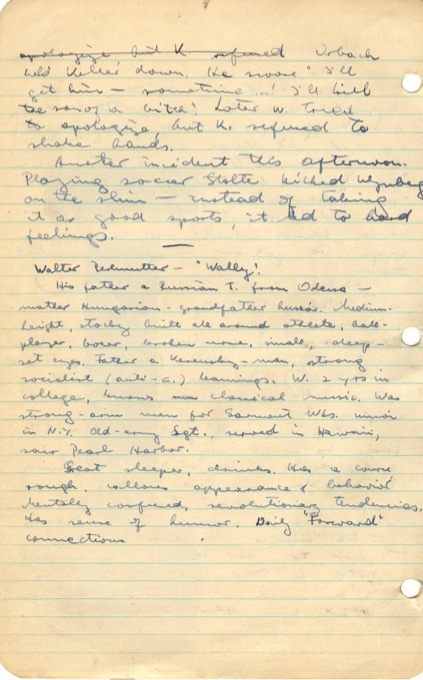Today, I read more of Opapa’s journal from 1944 and I also started looking at the history of North Africa during the War – so interesting.
In May 1944, when Opapa began his “big project,” he was waiting to be deployed. The long wait led to low morale, “bitching,” in Opapa’s words, and fights between some of the men. In his diary, Opapa lingered on describing the fights, but also the people – offering background on their parentage, political leanings, and appearance. Here is how he described Walter Perlmutter "Wally":
“His father a Russian J. from Odessa - mother Hungarian - grandfather hussár. Medium height, stocky built all around athlete, ball-player, boxer, broken nose, small, deep-set eyes. Father a Kerensky-man, strong socialist (anti-C.) leanings, w. 2 yrs in college, knows classical music. Was strong-arm man for garment wkrs union in N.Y. Old-army Sgt., served in Hawaii, saw Pearl Harbor. Great sleeper, drinks. Has a course, rough, callous appearance and behavior. Mentally confused, revolutionary tendencies. Has sense of humor. Daily [or “doing”?] “Forward” connections.”
Diary, George Gerbner, May 23, 1944
What a fantastic description. We can picture this man easily -- "medium height, stocky build," with a "broken nose" and "small, deep-set eyes." We know he has "revolutionary tendencies" and a "sense of humor" -- both seemingly positive traits -- but Opapa also added that he has a "course, rough callous appearance and behavior," and called him "mentally confused." He's a complex person, clearly of interest to Opapa but not someone to be respected or trusted. When I read this description, I feel like Wally is someone to watch out for, to keep at arms' length, but also someone who could potentially prove useful given the right circumstance.
Opapa is especially interested in the political commitments of Wally and his family. It took me a while to make out the word “Kerensky,” but what Opapa wrote is that Wally's father is a "Kerensky-man." Turns out Alexander Kerensky was a Russian revolutionary who led the Russian Republic for the three months of its existence – from late July 1917 until the November Revolution. His government was overthrown by the Bolsheviks in the October Revolution, and he fled to France. During World War II, he emigrated to the United States, and spent many years teaching and researching at the Hoover Institute at Stanford.
So if Walter’s father was a “Kerensky-man,” this explains why Opapa noted he is a “strong socialist” but has “anti-C.” (Communist) leanings. I'll be tracking these kinds of comments in Opapa's diaries, as I try to learn more about exactly what these terms meant to him, and how his political leanings changes over time. Here, he doesn't reveal his own thoughts about Wally or his parents, but he is clearly attuned to both their demeanor and their commitments. We know that Wally was involved in the NY Garment's worker's union, for instance. And I’m curious to know what it means to be a “strong-arm man” for the garments worker’s union -- it sounds violent...
A few more lingering questions and notes from this evocative description:
- What is the “Forward” connection? Is this a newspaper?
- A huszár (Wally’s grandfather was one) were cavalrymen who dressed in distinct uniform.





The Forward is a Jewish newspaper!